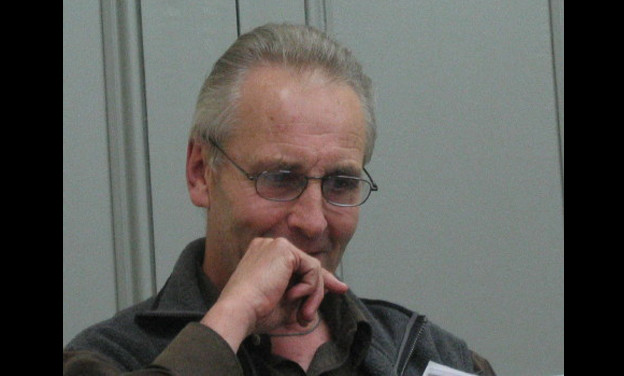'Language as a net of reality'
Rob Allan

‘The poetry of tomorrow will be finely articulated fact.’ — W.B. Yeats
Rob Allan has aimed explicitly to be postmodern. In his principal work to date, Karitane Postcards (1991), he probed into language as it came to him locally, enmeshed in or enmeshing the life of the senses, the nodes of local history, the debris of global affairs, ancestral lines, parenthood. He focused on the particular so closely as to call big pictures into question. Even as he did so, his poetry tended to usher in moments of elemental largeness — ‘his breath is a small surf through the wall’ — and expansive apprehension:
The ultimate measure of his success is perhaps the extent to which such moments are at home in a poetry of finely articulated fact.
In his more recent work the philosophical voice has come increasingly to dominate. The world is still very particular — ‘Language as a net of reality, life slipping through’ — but his stance within it is less forensic. It has become a more summary poetry. Language through which life slips must, of course, be a summary that is continuously eluded, and he continues to occupy the space of that appreciation, but there is a more immediately emblematic heft now about his particulars:
One hesitates, as a critic, to remark that ripeness is all, or that autumn is mellowly fruitful. Nevertheless, the fact remains that poets have their seasons, and Allan’s latest work has a harvest home quality implicit in the rhymes that occasionally round off his verse paragraphs.
There is a persistent melancholy edge to his world, a ‘ramshackle’ aspect, ‘History as a shaky bridge / over what was feared, disgraceful, unmentionable’, a hardscrabble intransigence that is calmly articulated. This was always part of his poetry and the core of its integrity. It underwrites the more expansive gestures of his current phase. — Damian Love
(Editors’ note: Rob Allan’s poems, here, are untitled. They float, but over and through particulars.)
A life of islands, the sea is endless
or seeming to curve out of sight
when the house is broken
a berth is waiting aboard Priscilla
and thirty eight souls in migration
bound for Australia. Disruption of the faith,
its independent course, set to a compass,
its lines of latitude within an understanding,
a shared outlook. What the world spoke then …
A life ignored, accustomed to familiar passages
of sounds and sights, wavelengths
that travel from Lean’s Rock to Highcliff
over the island; connections resounding pulse,
ignored like the rumble of trains rocking
the hillside. The wheeling of the tides,
the dark disclosure of the spiral stars,
a chosen sense of who we are,
pre-eminent fabulists of a truth to tell
in realms that rest upon a secret thought
coming from nowhere to this still place.
The cosmism of Herbert Spencer
seeing the universe as a connected whole
each particular in deconstruction
alive to the pulse, the pin-point analysis,
the chatter of probes,
the incomprehensible static
of the wheeling stars, like snow falling
over Bain’s paddock, Hudson’s gardens,
and to the Heads, the white-out harbour
with so much space to fill the absolute.
After the snow, the sun dries the road,
steams off the trees and sparrows peck
the dog turds off the tarmac.
Neighbours in new dispute, boundaries
and excluded viewpoints, each clearing
of a green reserve, transgression of use,
and paths that cross a place of history.
Each to their own lives,
to search a hidden governance
a groove of nature from which to gaze.
Authors of history in local telling
from direct source or reported second hand,
passages of recollection, diary entry,
scrapbook page, to illuminate and commend.
The road that leads community and utilities,
the services and industry, pastimes
to this time, where the end is known.
History as a shaky bridge,
over what was feared, disgraceful, unmentionable
the pain and pleasure of the slippery heart.
Shack, Mick and Mungo Lewis with understudies,
open the gate to the harvest,
plums ripening, the crab apple and quince,
undersea the sandbanks rinse gold and silver
flat fish camouflaged from a low net drag,
lie in delusion and endless enchantment,
pure summer days of light that scatters
over the channels, over the Heads
for dear life enters the tunnel of darkness
the ferret and the rabbit live in the dream.
Quarries of builder’s stone, the replica
of heritage, monuments engraving past,
struck to split in slabs, to edge off nature
to create the parish of a holy union
dislodged humanity, rocks that savoured cloud,
touched the spinning side show stars.
History to tell, and politics to reconcile,
a striving account of the good of days,
the present condition, the manifold significance
This view of life, more singular
though less defined, than speeding particle,
the Pacific Princess at the Heads,
enters the harbour on the swell,
all seeing frontage from ramshackle street,
presents the unaddressed and unaccounted,
the changing acres, the floating disc
a push against the infinite powers of space.
What holds together? What flies apart?
An atlas holding world of crafts and art.
Not to judge — tides sober arrival,
and a household of eighteen,
in a one bedroom cottage.
The purchase of Adelaide and William Lewis
tell of a fisherman’s hard drinking life.
A bible with the names of generations
a piano and a dresser and Adelaide’s fine seam.
Aspiring stories of seine fishermen’s silver catch,
ever fanciful versions sworn on oath to be true.
Language as a net of reality, life slipping through.
Cracked mirrors